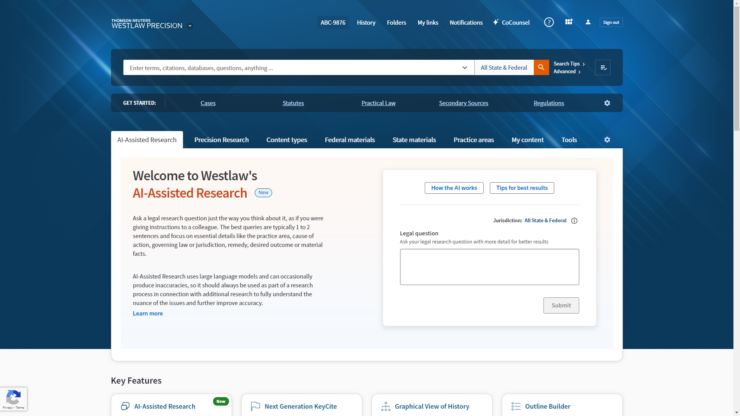Today Casetext announced that a new feature called Timeline is available in CoCounsel. Timeline makes it easy to assemble “clear, comprehensive, and accurate chronologies” from large volumes of documents by using AI to extract events and arrange them into a chronological series. Timeline enables attorneys to manipulate the results through filtering, editing and focusing. Casetext was acquired by Thomson Reuters earlier this year.
Time Saving with Timeline
According to the announcement, TImeline :”enhances attorneys’ thoroughness and inaccuracy saving hours of painstaking, manual work and achieving better results.” Timeline eliminate the risks of manual review by reading “every word” in every document in the collection being analyzed. The Timeline report includes citations supporting its findings to enable quick review and validation.
Timeline features
Continue Reading Casetext CoCounsel Launches Timeline Feature




 improve the quality of research results. Westlaw Precision will be sold as an upgrade to Westlaw Edge. Westlaw Precision is tackling the gnarly and perennial problem of language ambiguity by doubling down on taxonomy. At launch, Westlaw Precision covers 8 topics (Commercial law, Federal Civil Procedure, Federal Discovery and Evidence, Federal Remedies, Federal Class Actions, Employment, Securities, and Anti-trust.) Fifteen new topics will be released through 2023. Only the most recent 12 years of caselaw in each topic are included in search results.
improve the quality of research results. Westlaw Precision will be sold as an upgrade to Westlaw Edge. Westlaw Precision is tackling the gnarly and perennial problem of language ambiguity by doubling down on taxonomy. At launch, Westlaw Precision covers 8 topics (Commercial law, Federal Civil Procedure, Federal Discovery and Evidence, Federal Remedies, Federal Class Actions, Employment, Securities, and Anti-trust.) Fifteen new topics will be released through 2023. Only the most recent 12 years of caselaw in each topic are included in search results.
 legal tech continued their pursuit of innovation and market share. Most of us had a sense of whiplash and disbelief when the world came to a virtual halt in March 2020. Law librarians who had built digital libraries over the years offered their attorneys a fairly seamless transition to their work from home desktop. Within weeks most legal publishers had developed a special COVID offering. These ranged from free alerts, to primary sources and workflow toolkits. Despite all of these efforts law librarians and knowledge managers faced a gap in COVID coverage. Almost overnight a “gray literature” emerged which major legal publishers were not
legal tech continued their pursuit of innovation and market share. Most of us had a sense of whiplash and disbelief when the world came to a virtual halt in March 2020. Law librarians who had built digital libraries over the years offered their attorneys a fairly seamless transition to their work from home desktop. Within weeks most legal publishers had developed a special COVID offering. These ranged from free alerts, to primary sources and workflow toolkits. Despite all of these efforts law librarians and knowledge managers faced a gap in COVID coverage. Almost overnight a “gray literature” emerged which major legal publishers were not librarians develop systems for sanitizing and quarantining books? In today’s digital world -– is it even worth the trouble?
librarians develop systems for sanitizing and quarantining books? In today’s digital world -– is it even worth the trouble?